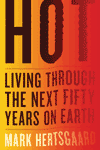 Not infrequently when reading and reviewing a book I find myself wishing there was some way of lingering longer on what it has to say before the spotlight moves on. David Orr’s Down to the Wire: Confronting Climate Collapse, published in 2009 and reviewed here, was one such book, and it was therefore with pleasure that I saw it highlighted on Joe Romm’s Climate Progress a few days ago. A paperback version is to be published in some months’ time and Orr (pictured) had sent Romm a copy of the new preface.
Not infrequently when reading and reviewing a book I find myself wishing there was some way of lingering longer on what it has to say before the spotlight moves on. David Orr’s Down to the Wire: Confronting Climate Collapse, published in 2009 and reviewed here, was one such book, and it was therefore with pleasure that I saw it highlighted on Joe Romm’s Climate Progress a few days ago. A paperback version is to be published in some months’ time and Orr (pictured) had sent Romm a copy of the new preface.
He contacted Romm because of a post Romm had written the previous day on the necessity of including science-based (dire) warnings as an essential part of good climate messaging, along with a clear explanation of the myriad clean energy solutions available and the multiple benefits they deliver. Romm was exasperated at the idea (and apparent White House practice) of not mentioning global warming or climate change but simply concentrating on green jobs, national pride, and reducing dependence on foreign oil. He regards it as a foolish strategy. Continue reading “Telling the whole truth”


 The arrival of a Wind Energy Association Newsletter suggested it might be time for an update on wind power in New Zealand. It’s nearly two years since I
The arrival of a Wind Energy Association Newsletter suggested it might be time for an update on wind power in New Zealand. It’s nearly two years since I